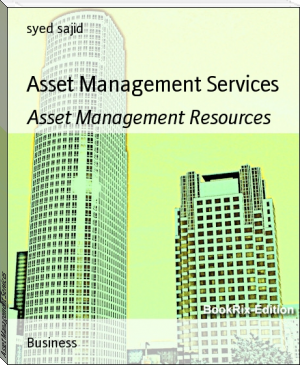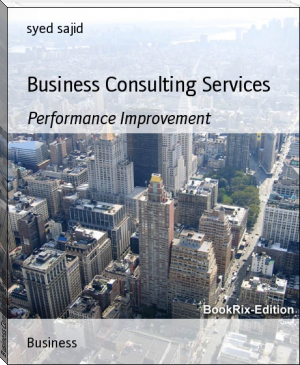Zimbabwe Business Manual 101 - Fidelis Fengu (well read books TXT) 📗

- Author: Fidelis Fengu
Book online «Zimbabwe Business Manual 101 - Fidelis Fengu (well read books TXT) 📗». Author Fidelis Fengu
Corporation A business may incorporate without an attorney, but legal advice is highly recommended. The corporate structure is usually the most complex and more costly to organize than the other two business formations. Control depends on stock ownership. Persons with the largest stock ownership, not the total number of shareholders, control the corporation. With control of stock shares or 51 percent of stock, a person or group is able to make policy decisions. Control is exercised through regular board of directors' meetings and annual stockholders' meetings.
The manual will not touch on co-operatives or associations as these are a complex organ and are not regulated under the Companies Act of Zimbabwe. That being said , a lot of would be business owners lose heart at this stage of registration , there are several consultants who claim to register companies and charge too much money , which then kills the entrepreneur’s dream. As an entrepreneur you need to be street smart and understand processes and procedures to ensure that you are not fleeced of your money by other entrepreneurs.
As the Zimbabwe Business Manual we have a company that is well organised and affordable to register your company and serve as your accountants, and company secretaries. This company is able to advise and refer you to all the relevant places regarding company registration and regulation. Also understand that there are city licences that are necessary depending on where the business is operating from and what line the business is involved in and these are variables that cannot be expounded in a single chapter. We therefore recommend consulting the following:
HARARE CONTACT : UNIGLOBE ZIMBABWE P/L
Mr. E. Nyakabau , 7th Floor Throgmorton House Cnr. S. Machel Ave. And J. Nyerere in Harare
Tel : (+263 4) 751 714 / 756 730 or cell : 0773440174 or email: edie@uniglobe.co.zw
www.uniglobe.co.zw
Uniglobe Zimbabwe specialises in Company Formations , Registrations, Accounting Services, Taxation, Auditing .
BULAWAYO CONTACT: RATIDZO MAKONI
Ratidzo is a private Finance and Accounting consultant who also does cashflows, and company registration, she is highly educated and honest young woman that we highly recommend for start-ups in Bulawayo
TEL: 0772872949 OR Email: ratimakoni@gmail.com
Once your business is registered you are allowed to and can source start up capital. Properly registered and constituted companies can attract and source capital which is vital to operations and the functionality of the business. Investors and financiers tend to find a bit of comfort in investing in a registered entity versus an individual with just an idea and a dream yet without any legal registration. The next topic will help you raise capital or finance for your business.
FINANCING YOUR BUSINESS
Financing Your Business Start up
Before we get into this topic , a number of people claim that muZimbabwe hamuna mari, imi , Zimbabwe is a $4billion economy , meaning kuti pane $4 billion in value be it in cash or assets ikutenderera mu Zimbabwe moti hamuna mari imi ka.......On a serious note there is always enough money for a profitable idea. No sane banker or investor will miss an opportunity to invest in a profitable and sustainable business. The important thing is to get your ducks in a row and you will be forever bankable.
Allow me to recommend a financial partner, there are some banks that take clients seriously, they care about individuals and they like to build a long term relationship with their clients. The banks I am about to recommend went through a tough time just like the Zimbabwean economy and they managed to come up.The Banks recently met the operating requiremnets from the RBZ. These banks are applauded for their pro people innitives. We hereby recommend business startups to utilize the METBANK Business startup initiatives.
CONTACTS: E-mail: info@metbank.co.zw, www.metbank.co.zw Tel: (04) 773401/ 7734506/774964/777256
Metbank has interesting products and services for the entrepreneur, they have facilities to help you buy your own stand , and they have business facility that they call Agency banking. We would like to recommend that entrepreneurs try registering for the METBANK Agency banking program. It has very good opportunities for business persons.
POSB is a pro poor and pro people bank that has accessible banking products for entrepreneurs. The advantage of POSB is that it is a nationwide bank and is easily accessible at community level. Contacts (0242) 252595/6; 0732200888; Toll-Free - 08004271
Empower Bank is a newly established banking institution that specializes in banking products for the entrepreneur with a deliberate bias towards young people. www.empowerbank.co.zw for more information or visit the nearest ministry of youth office: Contacts. Branch: Tendeseka Park, Block 4, First Floor Samora Machel Avenue, Harare. Tel: +263 242 709 550 - 709 555. Email: info@empowerbank.co.zw.
The Women's bank is another powerful institution that focuses on helping female entrepreneurs. www.womensbank.co.zw for more information or visit the nearest ministry of women's office in your area Contacts - (0242) 252595/6; 0732200888; Toll-Free - 08004271
One key to a successful business start-up and growth is your ability to obtain and secure appropriate financing. Raising capital is the most basic of all business activities. But, as many new entrepreneurs quickly discover, raising capital may not be easy; in fact, it can be a complex and frustrating process. However, if you are informed and have planned effectively, raising money for your business will not be a painful experience.
This information summary focuses on ways a small business can raise money and explains how to prepare a loan proposal.
Finding the Money You Need
There are several sources to consider when looking for financing. It is important to explore all of your options before making a decision.
Personal savings: The primary source of capital for most new businesses comes from savings and other forms of personal resources. While credit cards are often used to finance business needs, there may be better options available, even for very small loans.
Friends and relatives: Many entrepreneurs look to private sources such as friends and family when starting out in a business venture. Often, money is loaned interest free or at a low interest rate, which can be beneficial when getting started.
Banks and credit unions: The most common source of funding, banks and credit unions, will provide a loan if you can show that your business proposal is sound.
Venture capital firms: These firms help expanding companies grow in exchange for equity or partial ownership.
Additional Sources of Capital
Credit Cards
Customer Financing
Employee Stock Ownership (ESOP)
Factoring Accounts Receivables
Home Equity Loans
Mergers and Acquisitions
Purchase Order Financing
Strategic Partnering
Borrowing Money
It is often said that small business people have a difficult time borrowing money. This is not necessarily true. Banks make money by lending money. However, the inexperience of many small business owners in financial matters often prompts banks to deny loan requests. Requesting a loan when you are not properly prepared sends a signal to your lender. That message is: High Risk! To be successful in getting a loan, you must be prepared and organized. You must know exactly how much money you need, why you need it, and how you will pay it back. You must be able to convince your lender that you are a good credit risk.
Types of Business Loans
Terms of loans may vary from lender to lender, but there are two basic types of loans: short-term and long-term. Generally, a short-term loan has a maturity of up to one year. These include working capital loans, accounts receivable loans and lines of credit.
Long-term loans have maturities greater than one year but usually less than seven years. Real estate and equipment loans may have maturities of up to 25 years. Long-term loans are used for major business expenses such as purchasing real estate and facilities, construction, durable equipment, furniture and fixtures, vehicles, etc.
ALTERNATIVE FINANCIERS
Allow us to recommend another business financier, there is a company called VANTAGE HOLDINGS, they own VANTAGE MICROFINANCE AND CREDIT COMPANY
VANTAGE HOLDINGS
CONTACTS 10 Bates Street , Milton Park, Harare
Tel: (04) 251651/3 www.vantageholdings.com
Approval of your loan request depends on how well you present yourself, your business, and your financial needs to a lender. Remember, lenders want to make loans, but they must make loans they know will be repaid. The best way to improve your chances of obtaining a loan is to prepare a written proposal.
Loan Proposals
A well written loan proposal contains the following:
General Information
Business Description
Management Profile
Market Information
Financial Information
General Information
Business name, names of principals, ID number for each principal, and the business address.
Purpose of the loan (exactly what the loan will be used for and why it is needed)
Amount required (the exact amount that you need to achieve your purpose)
Business Description
History and nature of the business (details of what kind of business it is, its age, number of employees, and current business assets)
Ownership structure (details on your company’s legal structure)
Management Profile
Develop a short statement on each principal in your business providing:
Background
Education
Experience
Skills
Accomplishments
Market Information
Clearly define your company’s products as well as your markets.
Identify your competition and explain how your business competes in the marketplace.
Profile your customers and explain how your business can satisfy their needs.
Financial Information
Financial statements, balance sheets, and income statements for the past three years. If you are starting out, provide a projected balance sheet and income statement.
Personal financial statements on yourself and other principal owners of the business.
Collateral that you would be willing to pledge as security for the loan
How Your Loan Request Will Be Reviewed
When reviewing a loan request, the lender is primarily concerned about repayment. To help determine this ability, many loan officers will order a copy of your business credit report from a Bank or payslip statement.Therefore, you should work with these agencies to help them present an accurate picture of your business.
What the Lending Officer looks for:
Using the credit report and the information you have provided, the lending officer will consider the following issues:
Have you invested savings or personal equity in your business totalling at least 25% to 50% of the loan you are requesting? (Remember: a lender or investor will not finance 100% of your business.)
Do you have a sound record of credi-tworthiness as indicated by your credit report, work history, and letters of recommendation? This is very, very important.
Do you have significant experience and training to operate a successful business?
Have you prepared a loan proposal and business plan that demonstrates your understanding of and commitment to the success of the business?
Does the business have sufficient cash flow to make the monthly payments?
The Financial Six C’s
Loan Officers also evaluate you on the following:
CHARACTER: The degree to which a borrower feels a moral obligation to pay his/her debts, measured by the credit and payment history.
CAPACITY TO PAY: A subjective determination made by a lender based upon an analysis of the borrower’s financial statements and other information.
CAPITAL: The amount of capital in a business is equal to the total of capital from debt and equity. Lenders prefer low debt-to-asset and debt-to-worth rations and high current ratios.
These indicate financial stability.
COLLATERAL: An asset owned by the borrower, but promised to a lender against nonpayment of the loan. The amount of collateral varies from lender to lender. The closer the collateral value is to the loan amount, the more comfortable the lender will be that the loan will be repaid.
CONDITIONS: General economic, geographic, and industry
CONFIDENCE: A successful borrower instills confidence in the lender by addressing all the lender’s concerns on the other Financial C’s. Their loan application sends the message that the company is professional, with an honest reputation, a good credit history, reasonable financial statements, good capitalization, and adequate collateral
BASIC FINANCING
Financing Basics
While poor management is cited most frequently as the reason businesses fail: inadequate or illtimed financing is a close second. Whether you're starting a business or expanding one, sufficient ready capital is essential. But it is not enough to simply have sufficient financing; knowledge and planning are required to manage it well. These qualities ensure that entrepreneurs avoid common mistakes like securing the wrong type of financing or asking for too much or too little.
Before Financing, Ask:
Do you need more capital or can you manage existing cash flow more





Comments (0)